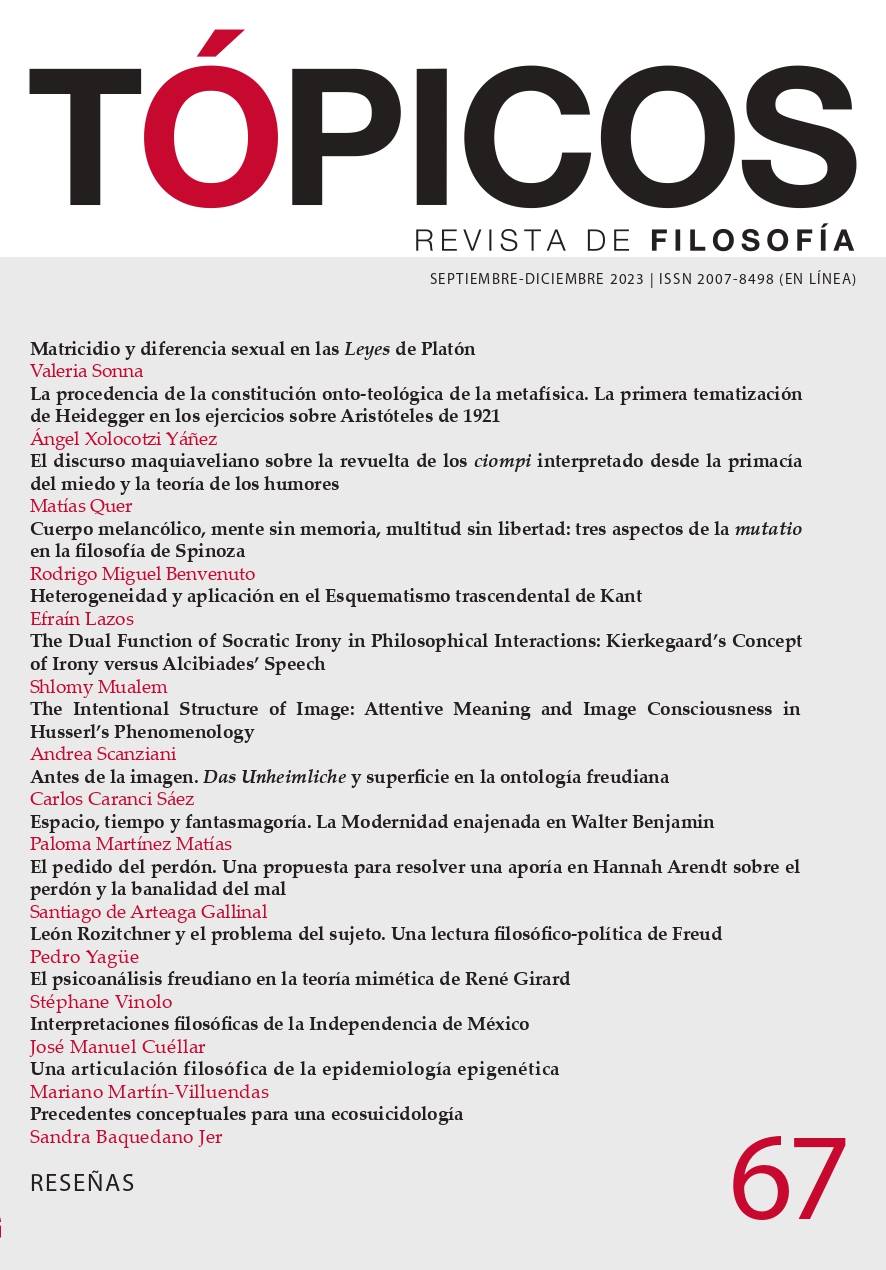Publicado 2023-08-01
Palabras clave
- inmanencia,
- mutación,
- afectos,
- política,
- conservación
Derechos de autor 2023 Tópicos, Revista de Filosofía

Esta obra está bajo una licencia internacional Creative Commons Atribución-NoComercial-SinDerivadas 4.0.
Cómo citar
Resumen
El propósito de este artículo es analizar el pensamiento de Spinoza a partir de las posibles articulaciones que se presentan de la noción de mutatio. Dadas las resonancias físicas de este concepto y sus implicancias a partir del encuentro entre los cuerpos más simples y los cuerpos compuestos, establecemos tres aspectos que permiten pensar la mutación, su diferencia con la transición, y su vínculo con la conservación. En primer lugar, tomamos como base el análisis de la disposición melancólica y su afectación en el cuerpo y la mente a partir del ejemplo del rey Saúl que Spinoza aborda en el Tratado teológico-político (I, 3). En segundo lugar, analizamos la mutatio a partir del caso particular de amnesia que padece un cierto poeta español (en Ética, IV, prop. 39, esc.). Por último, planteamos la mutatio en sus aspectos políticos y los problemas que se plantean a partir de la conservación y mutación de la forma. En los tres casos encontramos una posibilidad de pensar la mutatio en consonancia con el proyecto spinoziano y la trama relacional en la cual se desarrollan estos conceptos fundamentales de su filosofía.
Referencias
- Abdo Ferez, C. (2020). Naturaleza e imaginación en Spinoza. Nuevo Itinerario: Revista de Filosofía, 16(1), 3-21.
- Arendt, H. (2006). Sobre la revolución. P. Bravo (trad.). Alianza.
- Cicerón, M. T. (1995). Opere politiche e filosofiche. Volume primo. Lo Stato, Le leggi, I doveri. L. Ferrero y N. Zorzetti (trads.). Unione Tipografico-editrice Torinese.
- De Guimaraens, F. (2013). Spinoza e os dois sentidos políticos da mutação no Tratado político. En D. Tatián (ed.), Spinoza. Noveno coloquio. (pp. 153-163). Editorial Brujas.
- Del Lucchese, F. (2009). Conflict, Power, and Multitude in Machiavelli and Spinoza. Tumult and Indignation. Continuum.
- Domínguez, A. (1995). Biografías de Spinoza. Alianza
- De Góngora, L. (1633). Todas las Obras de Don Luis de Gongora en varios poemas. Recogidos por Don Gonzalo de Hozes y Cordova, natural de la ciudad de Cordova. Alonso Pérez. URL: http://bdh-rd.bne.es/viewer.vm?id=0000188477.
- Jaquet, C. (2013). La unidad del cuerpo y de la mente. Afectos, acciones y pasiones en Spinoza. C. Paccazochi y M. E. Garbino (trads.). Encuentro Grupo Editor.
- Maquiavelo, N. (2018). Tutte le opere. Secondo l’edizione di Mario Martelli (1971). Bompiani.
- Matheron, A. (1988). Individu et communauté chez Spinoza. Les Éditions de Minuit.
- Mignini, F. (2007). Afectos de la potencia. En E. Fernández y M. de la Cámara (eds.), El gobierno de los afectos en Baruj Spinoza. (pp. 173-185). Trotta.
- Monaco, D. (2018). Individuation and Death in Spinoza’s Ethics. The Spanish Poet Case Reconsidered. British Journal for the History of Philosophy, 27(5), 1-18.
- Morfino, V. (2020). The Spinoza-Machiavelli Encounter. Time and Occasion. Edinburgh University Press.
- Spinoza, B. (1924). Opera. Cuatro volúmenes. C. Gebhardt (ed.). Carl Winters Universitätsbuchhandlung.
- Spinoza, B. (1993). L’Éthique. A. Guérinot (trad.). Ivrea.
- Tatián, D. (2009). Spinoza y la paz. Revista Conatus. Filosofía de Spinoza, 3(5), 45-50.
- Totaro, P. (2007). Notas sobre la memoria y la teoría de los afectos. En E. Fernández y M. de la Cámara (eds.), El gobierno de los afectos en Baruj Spinoza. (pp. 215-223). Trotta.
- Vinciguerra, L. (2005). Spinoza et le signe. La genèse de l’imagination. Vrin
- Visentin, S. (2004). Acutissumus o prudentissimus? Intorno alla presenza di Machiavelli nel Trattato político di Spinoza. En Etica & Politica / Ethics & Politics, 4(1), 1-17.
- Zourabichvili, F. (2002). Le conservatisme paradoxal de Spinoza. Enfance et royauté. Presses Universitaires de France.
- Zourabichvili, F. (2014). Spinoza. Una física del pensamiento. S. Puente (trad.). Cactus.





